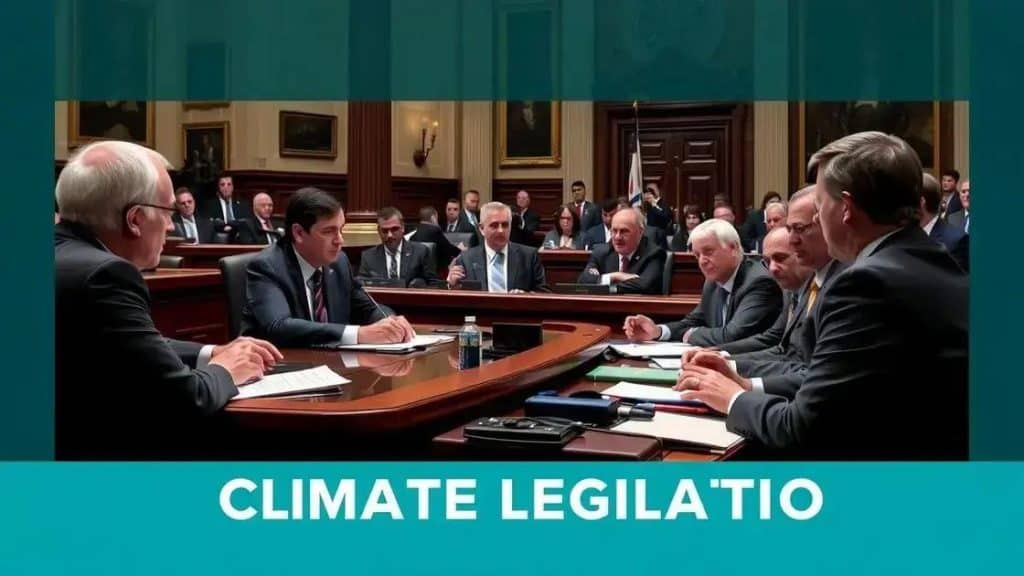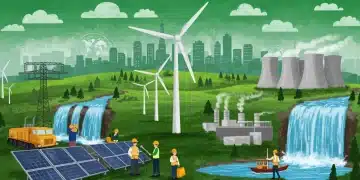Bipartisan climate legislation gains traction in Congress

Anúncios
Bipartisan climate legislation gains traction as lawmakers unite to promote comprehensive policies focused on renewable energy, emissions reduction, and community engagement, fostering a sustainable future.
Bipartisan climate legislation gains traction as lawmakers recognize the urgent need for comprehensive policies. With various stakeholders coming together, it’s time to explore how these developments affect our environment and future.
Anúncios
Current state of bipartisan climate legislation
Understanding the current state of bipartisan climate legislation is crucial as it shapes the frameworks for our environmental future. Lawmakers are beginning to realize that climate change is an pressing issue that requires immediate action and collaboration.
As of now, various bills and initiatives are circulating in Congress, with both parties showing interest in developing policies that promote sustainability. This shift in approach indicates a growing recognition of the need for effective, actionable climate strategies.
Anúncios
Key Components of Recent Bills
Many of the latest bipartisan efforts focus on addressing specific climate challenges through innovative solutions. Some of the key components include:
- Investment in renewable energy sources
- Creation of green jobs to support economic growth
- Strengthening regulations on emissions
- Development of sustainable infrastructure
These components reflect a balanced approach to handling climate issues while promoting economic stability. Furthermore, public sentiment is increasingly supporting legislative action, urging politicians to collaborate regardless of party lines.
Despite some challenges, the collaboration observed in recent months signals a promising trend towards more cohesive climate strategies. Lawmakers are learning to set aside partisan differences in favor of initiatives that benefit both the planet and the populace. Citizen advocacy also plays a significant role, pressuring legislators to prioritize environmentally conscious legislation.
Challenges Ahead
However, hurdles still exist. Opposition from various industries and differing priorities among lawmakers can slow progress. It remains vital to keep dialogues open, ensuring that each voice is heard while pushing for necessary changes.
In conclusion, the current state of bipartisan climate legislation showcases a critical shift towards unity in tackling climate change. As discussions progress, the hope is that these initiatives will lead to impactful legislation that balances environmental and economic needs.
Key players driving climate initiatives

Identifying the key players driving climate initiatives is essential for understanding how policy changes occur. From lawmakers to grassroots organizations, a diverse group contributes to the ongoing dialogue about climate action.
In recent months, several influential figures and organizations have emerged. These individuals are not only aware of the need for sustainable policies but are also taking action to ensure they are implemented effectively.
Influential Figures in Climate Legislation
Leading the charge are political leaders who are committed to environmental issues. Their roles often include:
- Championing renewable energy projects
- Promoting legislation that lowering emissions
- Fostering public-private partnerships
- Raising awareness through public speaking and campaigns
Furthermore, scientists and researchers provide crucial data that guide legislation. Their expertise informs policymakers about the latest developments in climate science, highlighting potential impacts and solutions. As these experts collaborate with lawmakers, the quality of proposed policies improves significantly.
Another vital component is advocacy groups that unite citizens around climate causes. These organizations mobilize public support and encourage community action. They help frame the conversation, making it clear why legislative change is needed.
Business Leaders and Innovations
Business leaders are also key players. Many companies recognize that sustainability is not just good for the planet; it can also be profitable. By investing in green technologies, they pave the way for a cleaner economy. Their involvement often leads to innovative solutions that align with legislative efforts.
Ultimately, the synergy between these players creates a powerful movement for climate action. As public support continues to grow, it becomes easier for legislators to champion necessary changes for a sustainable future.
Impact on local and global environmental policies
The impact on local and global environmental policies due to recent bipartisan climate legislation is significant. As new laws are proposed, they shape how communities and countries approach environmental issues.
At the local level, cities and states are adopting measures that reflect these new policies. Local governments are increasingly investing in clean energy projects and enhancing public transportation systems. These changes not only help reduce emissions but also create jobs and improve public health.
Local Policy Changes
Some of the most notable impacts on local policies include:
- Increased funding for renewable energy initiatives
- Stricter building codes for energy efficiency
- Incentives for electric vehicle use and infrastructure
- Support for community gardens and green spaces
Moreover, local communities are becoming more involved in environmental decisions. Public forums and workshops allow citizens to voice their opinions and contribute to sustainable planning. This community engagement fosters a sense of ownership and responsibility towards local environmental issues.
Global Ramifications
On a global scale, bipartisan climate legislation sets a positive example for other countries. As the U.S. strengthens its environmental commitments, it encourages other nations to follow suit. Countries that see the benefits of policies promoting sustainability are likely to adopt similar measures, leading to greater collaboration on global issues like climate change.
International agreements are also influenced by local legislative actions. Countries that take significant steps toward reducing their carbon footprints may gain leverage in international negotiations. They can showcase the benefits of responsible environmental stewardship, such as improved air quality and economic stability.
The interconnectedness of local and global efforts reinforces the importance of a collective approach to climate action. By recognizing how local initiatives contribute to broader sustainability goals, stakeholders can work together more effectively.
Future outlook for climate action and legislation

The future outlook for climate action and legislation appears optimistic as momentum builds around bipartisan initiatives. Growing public awareness and concern for environmental issues encourage lawmakers to pursue effective solutions.
Many experts predict that we will see an increase in supportive legislation aimed at addressing climate change. This includes comprehensive laws that not only target emissions reduction but also promote sustainable practices across various industries.
Emerging Strategies
Future policies are likely to focus on several key strategies:
- Enhancing renewable energy development
- Implementing stricter emissions regulations
- Providing incentives for companies to adopt green technologies
- Investing in public transportation and infrastructure
These strategies reflect a shift toward more aggressive climate goals. As technology advances, solutions for reducing environmental impact will become more accessible and affordable.
Community Engagement
Community involvement will play a vital role in shaping future climate legislation. Grassroots movements are already gaining traction, urging local governments to adopt greener policies. As citizens become more active in advocating for change, policymakers will have to listen.
This trend of increased civic engagement indicates that climate issues will stay at the forefront of political discussions. Collaboration between various stakeholders—government, businesses, and the public—will pave the way for more holistic and effective climate solutions.
International Collaboration
Additionally, the need for global cooperation remains crucial. Agreements between countries to share technology and resources will be necessary to address climate change comprehensively. The success of these international efforts will depend on each country’s commitment to sustainable practices.
In summary, the future of climate action and legislation is poised for significant advancements, driven by innovation, public pressure, and a commitment to sustainability. These factors combined will help craft a more environmentally friendly world.
FAQ – Frequently Asked Questions about Bipartisan Climate Legislation
What is bipartisan climate legislation?
Bipartisan climate legislation refers to laws and policies that receive support from both major political parties to address climate change.
How does local action impact global climate policies?
Local actions can influence global climate policies by setting examples that other regions may adopt, showcasing successful sustainable practices.
Why is community engagement important in climate action?
Community engagement ensures that citizens have a voice in decision-making, which helps create policies that reflect public interest and enhances collective action.
What are the key strategies for future climate action?
Key strategies include investing in renewable energy, enforcing stricter emissions regulations, and promoting sustainable transportation and infrastructure.





